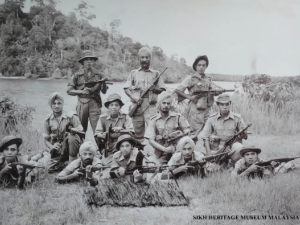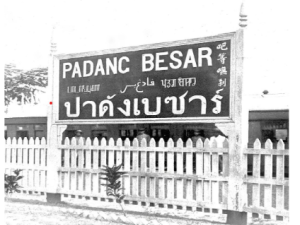Little did people dream that these men would ultimately become the bravest of mankind that world has ever seen and, be fighting side by side with the very men whom they were then preparing to resist. These men were a fine body of men, full of enthusiasm, energy and that never-to-die spirit which is a prerogative of a Sikh, and in respect to physique left nothing to be desired.
Sikhs have not one but thousands of martyrs. A martyr or shahid is one who by courting martyrdom bears witness to the truth of his faith and to his own unswerving commitment and allegiance to it.
The death of heroic men is holy, should they lay down their lives for a righteous cause, says Guru Nanak Dev Ji. At another place in the scripture, Kabir reiterates the same idea in a little different way as the Bhagat says:
sura so pahichaniai jo lare din ke het, purja purja kati marai kabahu na chhade khetu.
(The hero, entering the field, fights on without quailing. Know that man to be a true hero
Who fights in defence of the defenceless; Hacked limb by limb, he still flees not the field. (SGGS, Kabir, 1005)
Guru Gobind Singh Ji, in one of the concluding verses of his Chandi Charitra Ukti Bilas, seeks the divine boon to ever do noble deeds and be able to lay down his life for the sake of righteousness:
deh siva baru mohi ihai subh karman te kabahun na taron,
na daro ari so jab jai laron nischai kari apuni jit karon
ar sikhaho apane hi mana ko ih lalach hau gun tau ucharo,
jab av ki audh nidan banai ati hi ran mai tab jujh maron.
(Lord, Grant me this boon:
Never may I turn back from righteousness;
May I never turn back in fear when facing the foe;
May I ever instruct my mind to chant Thy praises;
And when the end arrives,
May I fall fighting on the field of battle.)
To stand up to a righteous cause, to stand up in defence of the hapless and defenceless, to be willing to make even the supreme sacrifice for the sake of a cause held dear by a fellow citizen - all this requires a lot of courage and fearlessness. The scripture repeatedly exhorts man to be fearless and give up cowardice.
"Thus, in Sikh faith, one is required to give up all cowardice, be brave and courageous enough to stand up against all kinds of injustice, oppression and highhandedness. Guru Nanak and his successors prepared their disciples for this with a view to erecting a social setup where values of equality and love, justice and tolerance, compassion and self-respect prevail. Clearly, this was the time for Guru Arjan Dev Ji (1563-1606) to bear witness to the truth of his faith and to his own unswerving commitment and allegiance to it. Guru Arjan Dev Ji stood for the religious freedom of man and refused to renounce his faith when so desired by the ruler of the day. He willingly offered himself to suffer any privation and even meet death for upholding his principles. Thus, Guru Arjan Dev Ji, became the first martyr of the Sikh faith. When Guru Tegh Bahadur (1621-1675), the ninth Guru of the Sikh faith, assumed the spiritual leadership of the Sikh faith in 1664, he rather stood by the faith and would not waver; he was martyred by the Mughal Emperor.
The sacrifices made by Guru Gobind Singh Ji and especially the martyrdom courted by his young sons are exemplary. Guru Gobind Singh Ji sacrificed his entire family (including father, mother and sons), his own life and in fact everything that belonged to him. All the four sons of Guru Gobind Singh Ji courted martyrdom even before they were majors: the elder two, Sahibzada Ajit Singh and Sahibzada Jujhar Singh, laid down their lives at Chamkaur fighting against the Mughal forces supported by the hill chiefs who had pursued the Guru violating the vows they had taken to the contrary. These young boys were internalized during their formative days to stand against injustice and oppression and even be ready to sacrifice their lives whenever need be. The younger sons of the Guru, Sahibzadas Zorawar Singh and Fateh Singh, were bricked alive under orders of the Nawab of Sirhind: the young boys, were handed over to the Mughal satrap of Sirhind by an old servant of theirs who escorted them this way as they got separated from their father and other members of the family after vacating Anandpur. These young boys remained unflinched in their faith and without any wavering of mind preferred death to giving up their faith when forced to make the choice - a lesson they had learnt from their parents, their heritage." Banda Singh Bahadur, Maharaja Ranjit Singh, Bhagat Singh, Randhir Singh and many more, made great impact in Sikh history of heroism and they fought tooth and nail to preserve humanity from tyranny and oppression.
"The reputation of the Sikh soldier as one of the world's finest has its origins in the creation of the Khalsa in 1699 by Guru Gobind Singh Ji. The Khalsa, meaning, literally "purified ones, the Guru's own", are the Sikh men and women who choose to publicly affirm their commitment to their faith by taking Amrit or Khande di Pahul, the initiation by double-edged sword. Three hundred years ago at Anandpur Sahib, Guru Gobind Singh Ji's dramatic creation of the Khalsa was attended by tens of thousands of Punjabi farmers, traders, artisans, untouchables, and trained warriors who became the brothers and sisters of an unprecedented people's army of India.
The original Khalsa initiates were never "belly-soldiers", or mercenaries; soldiering was part of their spiritual make-up as defenders of religious freedom for all faiths at a time when the Mughal rulers of India were engaging in forcible and brutal conversions to Islam. 'To uphold right in every place and destroy sin and evil; that right may triumph, that good may live and tyranny be uprooted from the land' Guru Gobind Singh Ji said. With this, he set out to 'teach the sparrow how to hunt the hawk and one man to have the courage to fight a legion'. What the Guru succeeded in doing was to convert the Sikhs from humble peasantry of the Punjab into some of the greatest and most noble warriors in world history."
"This Warrior Saint book contains collection of rare and unpublished images in its endeavours to celebrate the heroic Sikh tradition and its history over the last three centuries. Within this work, there are examples of individual bravery, of undying loyalty, of courage and dedication to duty, which have elicited praise even from enemies. Included in this collection are rare images of Akali Sikhs (the descendants of the original Sikh army), images depicting the centuries-old partnership between the British and the Sikhs, and photographs documenting the relatively unsung role of Sikh soldiers during the two World Wars.
The images and quotes in Warrior Saint, have been selected to show the generations of Sikhs who have sacrificed so much, including their lives, in virtually every field of battle, not just in their ancestral home of Punjab, but in Europe and the Pacific Rim. The images have been chosen to demonstrate the honest innocence and anonymity of these generations of Sikhs who have fought and died in a declaration of their faith."
Recent political events may not seem to represent the worth of the Sikh military tradition that this work celebrates. However, it would have been incomplete had we not included some mention of the significant happenings in Punjab since the 1980s. This courage and positive values have been instilled within Sikhs and it is no surprise, statistically speaking, although Sikhs made up less than 2% of the population of India, they contributed to increase the number of volunteers in the Indian Army from 189,000 to over 2.5 million for the British Imperial Forces by the end of the World War 1 and 2. More than 83,000 turban wearing Sikh Soldiers were killed and another 109,000 were wounded in their fight for freedom; not for their own freedom but of the world. Nearly one third of the total awards for deeds of valour and daring sacrifices on the battlefields were won by Sikh Soldiers.
The Sikh Soldiers did not just fight for their freedom in India, but they also volunteered to fight for the freedom of others who lived in foreign lands. These heroes of ours died for the world. They died that freedom might live. They died to help free the world from violence, hatred and tyranny and surely they have a right to expect that the present, as well as future, shall be worth their glad Sacrifice. These men had fought and died for the institutions which were cherished as vital to the interests of the people. They had died for the protection of our homes. Any man who held a title deed for that strip of land that he called his home owed a debt of gratitude, and had an obligation to fulfil to the men who fought on the battlefield. The soldiers were willing to sacrifice their all for the flag that floated in the breeze that day. It would not have been the time-honoured Union Jack, but the flag of the invader that would have floated in the breeze had these men not fought.
Sikhs are known by their deeds and actions. Their bravery and contribution to the allied victory is often overlooked, yet these courageous soldiers served in nearly every theatre of British operations. Sikhs fought with great courage and bravery in all the major battles fought in Malaya, Java, Hong Kong, Burma. In Europe and the Middle East they were engaged on the frontlines in Eritrea, Karen, Italy, Cyprus and Persia. In Africa, many sacrificed their lives at Sidi Barrani, El Alamein, Tunis, Abyssinia and Somaliland. With the tradition of unsurpassed valour, Sikhs won immortal glory on Gallipoli and in Palestine. Their bravery and heroism won them so many Victoria Crosses. It is amazing!
We must never forget the sacrifices made by the Spirit Born People of yesterday who fought and died to preserve the freedom we all cherish today.
Memorable Quotes of Sikh virtues and attributes:
"To me, The Sikh Community is one of the Stirring sagas of human history. It is a small but vigorous Community" - His Excellency, Mr. Lee Kuan Yew, Prime Minister of Singapore - November 1967
"They have for decades proved themselves peace loving and loyal citizens who have also played their part in the maintenance of law and order in the country. During the Emergency many lost their lives fighting for Malaya." - Y.T.M Tengku Abdul Rahman, Prime Minister of Malaysia - February 1968.
"Guru Nanak gave the Sikhs not only a religion but one that stresses piety of heart and sincere-devotion to one Great God. Guru Nanak also founded a well-knit society on catholicity of religious doctrines, social equality, democratic ideals, patriotic fervour, and a heroic spirit of valour and self-sacrifice. - Y.A.B. Tun Abdul Razak, Deputy Prime Minister of Malaysia - 1969
"Sikhs may be the minority with only about 150,000 in the country like Malaysia but their contributions are relatively phenomenal compared to the size of the community, "They did not flinch, but instead lost their lives when defending the country in the Second World War," - Y.A.B. Datuk Seri Najib Tun Razak, Prime Minister of Malaysia - 2010
References:
Concept and Tradition of Martyrdom in Sikh faith by Professor Dharam Singh; Sikh Spectrum. Issue 25th August 2006
Warrior Saints: Three Centuries of the Sikh Military Tradition by Amandeep S. Madra, Parmjit Singh
Harchand Singh Bedi (Malaysia)





